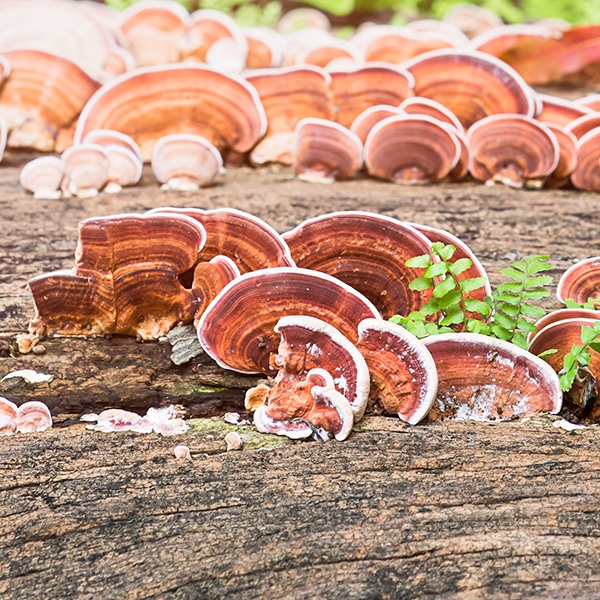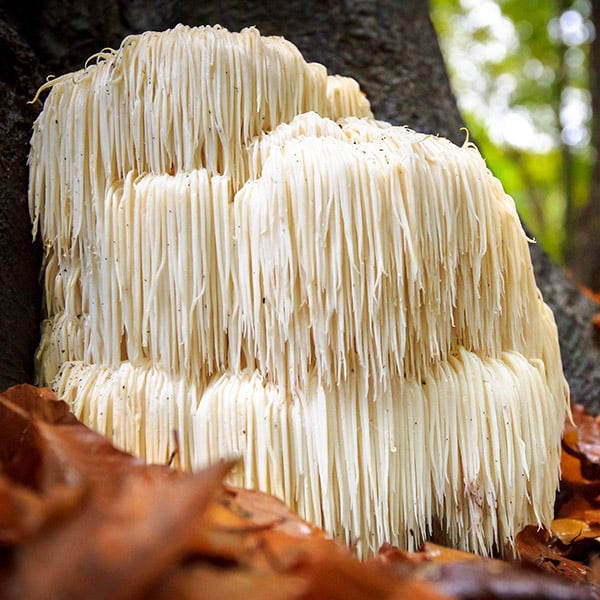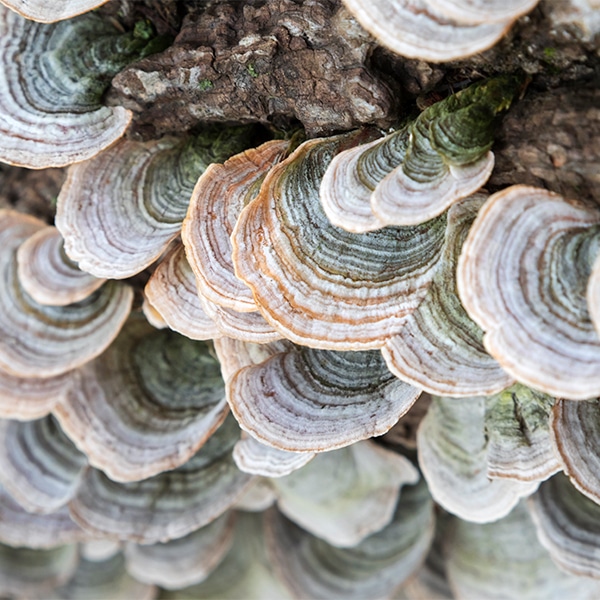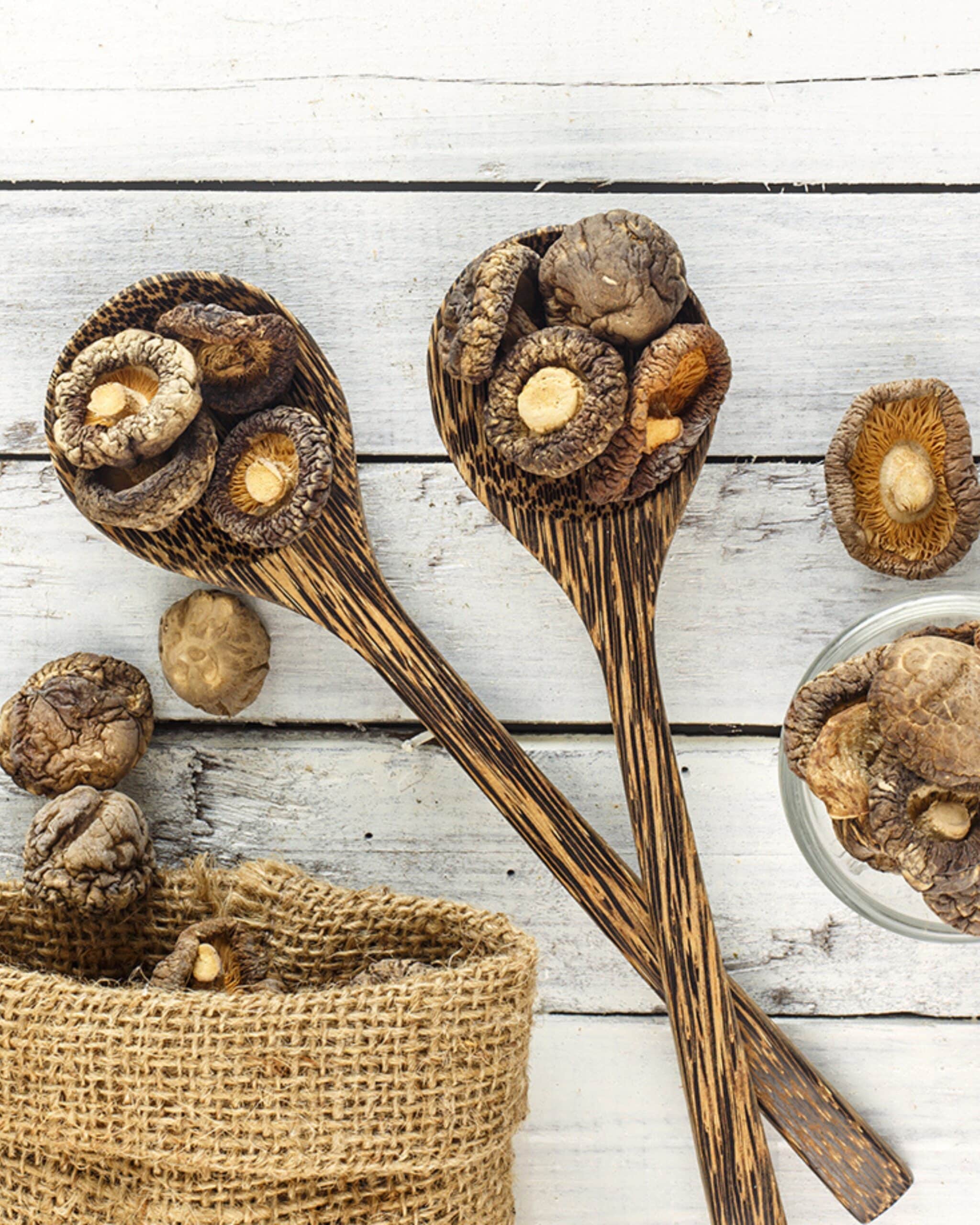Hiya Gorgeous!
Medicinal mushrooms have been used for their healing benefits for hundreds of years in places like China, Russia, Japan and Tibet. Chaga mushrooms, for example, have been used to treat diabetes, intestinal issues and various cancers. There are even records of Cordyceps being used as an aphrodisiac all the way back in the 15th century. Oh la la!
But, it wasn’t until relatively recently that medicinal mushrooms became mainstream in the West. Now they’re easily accessible online and in health food stores, and boast incredible health benefits like stress relief, improved sleep, cancer-fighting properties, glowing skin and a near-cure for the common cold.
The question is: Are these impressive benefits for real, or are they too good to be true?
I know that you’re confronted with news about the latest lotions, potions and remedies every single day. It can be hard to keep track and figure out what’s really worth your time. That’s why I love to go full-on Nancy Drew (picture me with a magnifying glass) and investigate these trends—so you don’t have to. We did it with CBD oil, we did it with beans—now we’re doin’ it with medicinal mushrooms!
Before we dive in, I know that you might be wondering about the difference between medicinal mushrooms and those you’re used to seeing in the grocery store. Everyday mushrooms have wonderful health benefits, too. They’re loaded with antioxidants and help boost your immune system. Plus, they’re delicious and work well as a meat substitute in many dishes (can you say grilled portobello burgers?!).
But many of the fabulous fungi we’ll chat about today aren’t your standard throw-em-in-a-stir-fry variety. Unlike our favorite buttons, oysters and truffles, some of these guys contain indigestible fiber and definitely don’t make tasty cooking ingredients. That’s why there are so many other ways to consume them, which we’ll cover when we get into each variety.
Here’s something else to keep in mind as you venture into the world of medicinal mushrooms: While some mushrooms are healthful and others are tasty, some will make you very sick. So it’s important to understand which are safe to consume and how they may help you. Think of them like supplements—everyone’s needs are different, so do your research and when in doubt, check with your doctor!
6 Medicinal Mushrooms: Uses, Benefits and How to Take Them
Today we’re going to talk about six of the most commonly used medicinal mushrooms: shiitake, reishi, chaga, lion’s mane, cordyceps and turkey tail.
1. Shiitake
Scientific name: Lentinula edodes
Superpower: Combats inflammation
Shiitake mushrooms are one of the few medicinal mushrooms that also happen to be delicious. In fact, they’re one of the five most popular mushrooms worldwide! But being tasty isn’t their only superpower. They’ve also been used for their health benefits for hundreds of years in Japan, China and Korea.
Shiitake mushrooms contain lentinan, which has strong anti-inflammatory, antitumor, antiviral, antibacterial and antiparasitic properties. What does all that mean? Well, not only can lentinan help destroy cancer cells, it may also ward off various infections and viruses. An injectable form of shiitake mushrooms is used alongside chemotherapy in China and Japan for the treatment of gastric cancer. Shiitake mushrooms have also proven helpful at lowering bad cholesterol levels.
How to take shiitake mushrooms:
Since shiitake mushrooms are so tasty, you can enjoy them in stir-fries, miso soup, grain-based dishes, casseroles or even curries. Just 5 g of dried shiitakes (about 1 oz fresh or one large mushroom) can lower markers of inflammation in the blood after a single meal! Fun fact: You can purchase dried shiitakes and keep them in the pantry for several months, which makes them a convenient staple. Then, just rehydrate them before adding to cooked dishes!
You can also take shiitake mushrooms as a supplement in pill form. Just be sure to look for organic varieties without added ingredients or gelatin. The only downside to shiitake mushrooms is that they’re rich in purines, meaning that folks who are prone to gout flare-ups may need to limit portion sizes or eat them less frequently.
2. Reishi
Superpower: Reduces stress and promotes balance

People suffering from seasonal allergies have also found great relief when supplementing with 1000 mg of reishi daily. And it doesn’t stop there—some folks have reported that reishi-infused skin creams can help reduce signs of aging.
How to take reishi mushrooms:
These medicinal mushrooms have no apparent side effects, so they’re great to try if you’re just dipping a toe in the shroomy waters. You can find them in many forms, including supplements, tinctures and powders. They’re also available as mildly flavored teas, coffees and hot cocoa mixes. My team has tried Four Sigmatic’s Hot Cacao with Reishi* (500 mg of reishi per serving!) and fallen in love with it. Whatever form you choose, beware of products made from inferior black reishi mushrooms as they are less potent. Look for red and purple varieties of reishi because they’re superior in quality and likely worth the added cost!
If you want to go the capsule or supplement route, look for brands that are certified pure. Be sure to pay attention to the recommended dosage instructions as concentrations will vary. Your integrative doc will probably have brand recommendations and give you specific instructions.
3. Chaga
Scientific name: Inonotus obliquus
Superpower: Knocks out the common cold
Chaga mushrooms may look like nothing more than a clump of dirt until you see their orange interior, but rest assured that these babies pack a serious healing punch. They grow on birch trees in very cold climates and have one of the highest antioxidant contents of ANY food! That’s why they’re often used to ward off the common cold.
A single 8-oz cup of chaga tea has the same number of antioxidants as 30 lbs of carrots. No, I’m not kidding! Also, the beta-glucans in these medicinal mushrooms stimulate the production of lymphocytes, which help regulate our immune system’s response to infections.
Chaga mushrooms have also been used to treat cancers and reduce tumor size, resolve digestive issues, manage blood sugars, lower bad cholesterol levels, and make hair and skin shinier, healthier and younger-looking. Oh, and for yet another cool detail about these amazing medicinal mushrooms: They’ve been consumed in Russia for hundreds of years!
How to take chaga mushrooms:
Hot water or alcohol are needed to break down the tough cell walls in chaga mushrooms and activate their beneficial compounds. That’s why tea, coffee and cocoa are popular ways to consume chaga mushrooms. In fact, chaga mushroom coffee became especially popular as a coffee substitute during the world wars because of its pleasant taste and ability to increase energy in a more balanced way than caffeine.
Supplements, tinctures and extracts of chaga are also available and are processed with hot water to activate the medicinal compounds. For defense against colds, some integrative docs recommend 1000-2000 mg of chaga extract when symptoms start to come on.
Even though people have been taking chaga mushrooms safely for centuries, doctors recommend that people with bleeding disorders and diabetes avoid them as they can accentuate the effects of anticoagulant medications and insulin. Chaga overuse may also tax your kidneys, so be sure to follow recommended dosages and work with your doc.
4. Lion’s Mane
Superpower: Improves focus and memory

Lion’s mane may even help prevent and reverse neurological diseases like Parkinson’s, Alzheimer’s and dementia because of its regenerative capability in the nerves of the brain and spinal cord! Research has shown that it can stimulate the synthesis of Nerve Growth Factor (NGF), which is why it may have such a positive effect on the neurological system. How cool is that?
How to take lion’s mane:
Lion’s mane is edible and has a seafoody taste, making it a great ingredient in stir-fries or faux crab cakes. It’s also available as an herbal supplement, tincture or tea. Four Sigmatic’s Mushroom Elixir Mix* may help you when brain fog sets in, and is delicious combined with cinnamon and hot oat milk (don’t worry—it’s not fishy in this form!).
Keep in mind: Some folks feel more focused within days of taking lion’s mane. But when it comes to anxiety and depression, research has shown that it may take at least 4 weeks to feel relief.
There aren’t any documented side effects or adverse reactions currently associated with lion’s mane. But, you know what I’m gonna say about checking with your doc… (Do I sound like a broken record?! ?)
5. Cordyceps
Scientific name: Ophiocordyceps sinensis and Ophiocordyceps militaris
Superpower: Boosts energy
Cordyceps have become famous for their supposed ability to improve athletic performance. I say “supposed” because we couldn’t find a study (yet!) that compares the performance of athletes taking cordyceps against those not taking them. But, we do know that cordyceps can boost ATP levels in the body. ATP is like a battery that powers your cells. When it comes to exercise and athletic performance, an abundance of ATP means increased strength, energy, capacity for explosive movement and overall stamina. I’d call that a competitive advantage!
Cordyceps have also been used for centuries to treat sexual dysfunction and fertility. Recent clinical studies demonstrate cordyceps’ ability to improve libido, as well as increase sperm count, survival rate and quality. This is good news, because many conventional medicines used to improve sexual health come with high costs and uncomfortable side effects.
Plus, like most medicinal mushrooms, cordyceps are rich in antioxidants, making them great for your immune system!
How to take cordyceps:
In the wild, cordyceps grow as a fungus out of the mummified carcasses of caterpillar larvae in high altitudes of the Himalayan mountains and in Tibet. This type (Ophiocordyceps sinensis) is rarely found in stores in the United States because it’s difficult and expensive to harvest. Most companies use artificially produced cordyceps (Ophiocordyceps militaris), which is grown out of grains, most often rice. They’re just as potent and cheaper to produce.
Cordyceps are available in tinctures, powders, capsules and liquid extracts. My team tried Four Sigmatic’s Cordyceps Mushroom Elixir Mix,* which has 1500 mg of cordyceps per serving. It would make a great addition to your morning smoothie!
I encourage you to check with your doc before taking cordyceps. Like chaga, they may interact with anticoagulant medications and can lower blood sugar too severely in people on diabetic medications. They also shouldn’t be taken by people with autoimmune diseases.
6. Turkey Tail
Superpower: Protects cancer patients

It’s been shown to help prevent cancer cell growth and encourage cancer cell death, but its real claim to fame has to do with the way it boosts the damaged immune system after cancer treatments. Turkey tail contains two unique beta-glucans: Polysaccharide-K (PSK) and Polysaccharopeptide (PSP). Both PSK and PSP are widely used in Japan to help repair and regenerate immune cells destroyed by chemotherapy while simultaneously stimulating the immune system in general to fight cancer and further infections. Wow, right?
How to take turkey tail mushrooms:
Turkey tail is edible, but rarely eaten because of how chewy it is. Most people who take turkey tail take it in capsule or tea form. Because turkey tail is grown in soil, it’s best to look for organic varieties to prevent pesticide and toxin exposure.
Mild side effects of diarrhea and dark stools have been reported, so follow your doctor’s recommendations when it comes to turkey tail and discontinue use if any side effects occur.
*A note on brands and ways to take medicinal mushrooms: My team tested some drink mixes from Four Sigmatic (not sponsored or gifted), but they’re by no means the only game in town! For example, one of my favorite supplement brands, Solaray, has a Reishi Mushroom supplement (600 mg per capsule). Pure Encapsulations (another favorite of mine) has a Mushroom Formula that contains maitake, reishi and shiitake! Also, my friend Jenny Sansouci has done a lot of research on this subject and provides some other product recommendations in her article here. There are plenty of options out there, so find the one that works for you.
Medicinal Mushrooms: The Bottom Line
Taking mushrooms as supplements may sound unfamiliar to you, but people all over the world have been using them for hundreds of years. Their proven ability to help protect us from infections, boost our immune systems, energize us, support our neurological health and more is nothing short of amazing. That’s nature’s magic at work, folks!
I’m excited about the many possibilities medicinal mushrooms have in store for us. Natural remedies like these, when paired with the right conventional methods and a healthy lifestyle, have so much healing potential—and that fills me with hope. I’ll be keeping an eye out for more studies and info, not to mention doing my own testing! And of course, I’ll keep you informed every step of the way.
Your turn: Have you tried medicinal mushrooms? If so, I’d love to hear about your experience in the comments below. If not, will you give them a shot?
Peace and marvelous mushrooms,



Kris,
Is Lion’s Mane safe for an autoimmune disease like PI-IBS?
Hi Kristie! This is Jennifer from Team Crazy Sexy. We haven’t delved that deep but would always recommend you speak to your trusted health care provider when introducing something new when you’re struggling with additional challenges. We’re sending you lots of love and healing energy, Kristie.
Intresting, will come back here once in a while.
Really good recipe…
I always read and learn from your posts Kris! Personally I have been using Four Sigmatics Reishi Elixir in the evening to help with sleep. I’ve struggled with insomnia for about 40 of my 53 years. It does make a difference. I have an adult son with insomnia and he finds it helpful as well.
Thanks for the recommendation, Sheridan! I’ll check it out. xo!
Fantastic info!! Thanks for sharing!
Thank you Kris for this wonderful info. I live where chaga is fairly easy to find, and I try really hard to get in there before the loggers do. I have been drinking chaga tea for about 2 years now. I don’t get sick, I can’t even remember the last time I had a cold. I know a part of it is my mind set, but I know a good part of it is the chaga tea. I have a permanent pot on my stove just for chaga. I drink it all day, and add it to my smoothies.
I’m pretty sure that it has helped clear up the fungus I had on my toes, hate to admit I had a fungus, but I did. I haven’t done anything else except drink chaga tea so what other conclusion can I come to?
Thank you so much for doing what you do, I love your meditations and your books, and you.
I’d like to add that I first found chaga at my local tea house in Rocky Mountain House, AB, Canada. I now forage for myself, like I need another excuse to head to the woods. 🙂
Love that you do your own foraging, Linda! That’s so cool. It’s wonderful to hear about all the benefits you’ve seen from drinking chaga. xo!
Thank you Kris for this great blog. Really very interesting. I will start with lions mane for my poor old brain and the fact that chemo has trashed my already sensitive nervous system. I will see if it helps with the neuropathy and the hearing loss. Exciting! Good to read everyone else’s comments too. Xx
Yay! Please let me know what you think once you get to try lion’s mane. Hope you love it, Pippa. xo!
Thank you for this great info Kris. I have just come across the SuperFeast brand here in Australia ?? I wondered if when selecting products, it’s preferable to get one mushroom variety or products with mushroom combinations (are they equally effective?). Thank you again!
Hi Kylie! I’m the nutrition director here at Crazy Sexy Wellness so I’ll chime in for Kris. When searching for supplements, you’ll want to compare the milligram amounts of the specific mushroom you’re interested in from supplement to supplement. There are readily available immune-boosting blends which include several of the immune-boosting mushrooms. But from what I understand, there’s no increased potency by combining mushrooms in one supplement. However, in some areas, blends are easier to find than single mushroom supplements. As always, check with your doc if you have specific questions about what might be best for you. xo! – Jen
I had peritoneal carcinoma in 2016. I had major surgery (debulking), removing most of my abdominal organs, followed by 18 weeks of chemo. My friends recommended Chaga tea which I drank every day (with apple juice). I am now cancer free for two years.
That’s so wonderful, Lesley. Thank you for sharing your story. Sending you so much love.
I have read that chaga mushrooms have NO side affects and that you can use as much as you want. We only drink chaga tea in the winter…we keep a crock pot going for a few months. We NEVER get sick.
I have a lot of experience with mushrooms, medicinal and culinary. I speak about mushrooms at SOMA Wild Mushroom Camp. I am thrilled that people are finally jumping on the mushroom bandwagon. Here is an article that I wrote many (12)years ago about the ‘shrooms. The evidence is even clearer today. https://www.theveggiequeen.com/2010/04/08/article5-htm/
Anyone who hasn’t tried them might be surprised at the benefits derived from taking them.
Thank you Kris for always knowing the perfect way to “break things down” for all of us! I’ve been drinking the Four Sigmatic mushroom mixes and am loving them! They are a perfect afternoon and evening treat. Knowing they have medicinal qualities is a home run! I recently went to a Restorative Yoga workshop and Reishi was served at the end! This is also a perfect holiday gift to my family and colleagues as I’m always trying to spread the good word on health and wellness! Awesome jobs as always sister!!
Thanks for the recommendation, Michelle! I’ll definitely check out Tamim—they sound great. xo!
Thank you for the kind words and what a great post! It is wonderful to see like-minded people so passionate about these amazing mushrooms! And the best part is, these mushrooms can be grown locally and organically! No need to settle for imported and processed powders ; )
– Liat from Tamim Teas
This was super helpful! I will try lions main for memory, anxiety and depression.
I had a severe fungal infection two years ago and I am wondering if mushrooms make CANDIDA worse or better?
Hi Rita! Great question! I’m the nutrition director here at Crazy Sexy Wellness, so I just looked into this and learned quite a bit. While candida yeast is a member of the fungi family and mushrooms are a fungus, you would think that mushrooms would be off the menu if you’re prone to candida overgrowth. But, because medicinal mushrooms are so powerful at boosting the immune system, fighting infections, have anti-fungal properties and provide prebiotics to promote a healthy microbiome, many integrative docs encourage medicinal mushroom intake for people with or prone to candida overgrowth. The majority of medicinal mushrooms have immune-boosting qualities, but reishi’s ability to balance the body, chaga’s powerful antioxidants, and shiitake’s antibacterial properties may be especially beneficial. As always, check with your doc for further guidance and recs. Hope this helps! xo – Jen
Great answer Jen.
I am also an RD and speak about medicinal mushrooms. People often ask about mushrooms and candida. As far as I know, people with candida or SIBO generally don’t have an issue with eating or taking mushrooms. There are many other foods which often contribute to the issue such as sugar, fruit and carbs that aren’t complex carbs.
Thanks Jill! You’re totally right — sugar is the biggest culprit when it comes to candida, and we have lots more info in our blog here: https://kriscarr.com/blog/how-to-heal-candida-treatment/ xo! – Jen
Thank you so much. It is food for thought and the best analysis of any particular food I have read in my lifetime. I will begin my journey of finding local sources for these mushrooms today.
So glad you found this helpful, Robert! Hope you find something you like—let me know what you think. xo!
As a cancer thriver, I had my cancer cells tested for chemo sensitivity and found that the mushroom, Agaricus Blazei killed 30% of the cells. Since then, I have been taking it in powder form in my morning smoothie every day.
That’s incredible, Karen. Thank you for sharing your experience. I’ll definitely check out that mushroom since it’s not on our list! Sending you lots of love.
Hi Kris, I have been taking medicinal mushrooms for about two years now for a poor immune system. I had eye infections, lip and moth sores and extreme fatigue. I started taking Stamens Mushrooms for Immune Health. The results are ama ing. My eyes, lips and mouth have not any issues since. However, if I don’t take them I start getting symptoms!
Wow, Barbara, thank you for sharing! I’m so glad you’ve found something to help with those symptoms. Mwah!
Oooh do I love shrooms! I have tried Four Sigmatic Lions Mane and I swear the first day I was able to focus and didn’t even need my afternoon green tea break. I felt I had hit the magical mushroom jackpot. As time went on I didn’t have that razor sharp, go all day feeling like when I had it that first day but really felt it kept up my mental (no brain fog) game! The only other mushroom product that has knocked my socks off was the Four Sigmatic Reishi Hot Cocoa. I sipped this at the end of the day last winter and felt downright naughty it was so indulgently good with almond milk. I can’t wait to do it again this winter! Thank you for the amazing article.
Thanks for sharing your experience, Cynthia! It’s great to hear that the Lion’s Mane has continued to help with brain fog—and that you enjoyed the hot cacao, yum! xo
How do I order
Hey Joanna! I included a couple of links to order on Amazon throughout the article. Hope you find something you like! xo